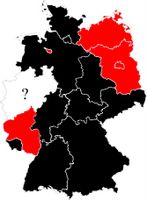Elections in NRW
 NRW (North Rhine-Westphalia), Germany's most populated state with its 18 million citizens is going to the ballots today. The election is - almost - exiting - since the SPD (Social Democratic Party of Germany) ruled for 39 years with the CDU (Christian Democracic Union of Germany) in the opposition. Since 2002, the federal government is lead by Peer Steinbrück (SPD) who formed a coalition with the Green Party (Alliance '90/The Greens). The Green's website features a Star Wars-related campaign video, the SDP is fighting to the end as well. Balloting is over at 6 p.m., then you can watch the results coming in here, it's one of the offical sources provided by the government.
NRW (North Rhine-Westphalia), Germany's most populated state with its 18 million citizens is going to the ballots today. The election is - almost - exiting - since the SPD (Social Democratic Party of Germany) ruled for 39 years with the CDU (Christian Democracic Union of Germany) in the opposition. Since 2002, the federal government is lead by Peer Steinbrück (SPD) who formed a coalition with the Green Party (Alliance '90/The Greens). The Green's website features a Star Wars-related campaign video, the SDP is fighting to the end as well. Balloting is over at 6 p.m., then you can watch the results coming in here, it's one of the offical sources provided by the government. Last election, May 2000, 13 million people were allowed to vote, but the turnout was only 56,7%, with only 7,336,411 valid votes. In 2000, the SPD got 42,8%, but right now, Infratest Dimap sees them at about 37%, CDU 43%, Green and FDP (Free Democratic Party 7,5%. Two days ago, SDP was at around 29% and the CDU at 45%. High unemployment rates - in some areas of NRW as high as 30% - unpopular national politics by the SPD and reforms as Hartz IV drove 800,000 SPD members away. They and the undecided are the ones who count most this time. Thus is looks pretty good for the CDU (and FDP).
On the other hand, Mr Steinbrück is more popular than Jürgen Rüttgers, but half of the people asked in a survey last week want a change of government. Another problem for Mr Rüttgers are excess mandates: If he doesn't win in his constituency, as it happened five years ago, and the CDU wins too many direct mandates, he won't be able to move into parliament. Unfortunately, this is a precondition to be elected for state prime minister. It's a minor obstacle though, another delegate can step down for Mr Rüttgers in case he doesn't make it. After the U.S. election, debates in television became popular, Mr Steinbrück and Mr Rüttgers met twice during the campaign with both times Mr Steinbrück narrowing the margin to his opponent.
The election is a test and thus important for the upcoming national election next year, too. Chancellor Schröder will be under heavy fire in case NRW is lost to the CDU, after all, it's the last SDP-Green Party coalition in Germany - and FDP's Politicians already asked for advanced elections. The result of the election won't have any impact on the Federal Council of Germany though - even if Schröder's SDP looses this state, the opposition wouldn't achieve a majority of 2/3 of the vote in the chamber.
Electoral Test for Germany's Government
» Post a Comment